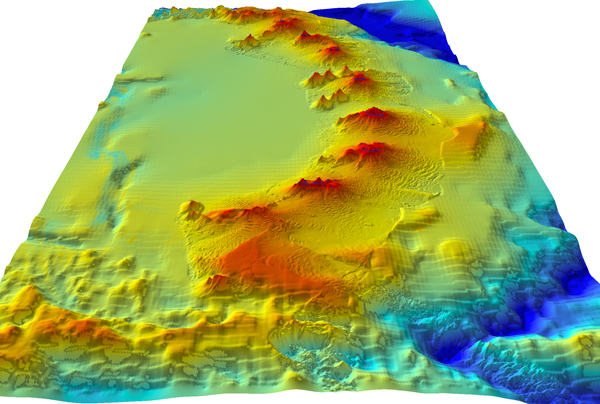Please note: Osher Rainforest will be closed for maintenance Jan. 14–16.
Science News
Underwater Volcanoes
July 19, 2011

What’s even more awesome than volcanoes? Underwater volcanoes. What’s even more awesome than that? ACTIVE underwater volcanoes!
Scientists from the British Antarctic Survey have discovered previously unknown volcanoes in the waters around the South Sandwich Islands. The researchers presented their findings at last week’s International Symposium on Antarctic Earth Sciences in Edinburgh.
Using ship-borne sea-floor mapping technology, the scientists found 12 volcanoes beneath the sea surface—some with heights up to 3km (almost 10,000 ft!). They discovered 5km (3mi) diameter craters left by collapsing volcanoes and seven active volcanoes visible above the sea as a chain of islands.
According to National Geographic Daily News:
The scientists were expecting to find volcanoes. For one thing, the South Sandwich Islands are actively volcanic. For another, in 1962, a passing British naval vessel found large patches of floating pumice that could only have come from an underwater eruption….But the researchers didn't expect to find volcanoes the size of Japan's Mount Fuji.
This sub-sea landscape, with its waters warmed by volcanic activity, creates a rich habitat for many species of wildlife and adds valuable new insights about life on Earth.
The research is also important for understanding what happens when volcanoes erupt or collapse underwater and their potential for creating serious hazards such as tsunamis. Since no one lives on the South Sandwich Islands, the actual threats in the area are minimal. From New Scientist:
…their remoteness should limit any danger they pose to human life. "Any wave produced is likely to be attenuated by the size of the Pacific Ocean," says [Phil] Leat [from the British Antarctic Survey].
“There is so much that we don't understand about volcanic activity beneath the sea—it’s likely that volcanoes are erupting or collapsing all the time,” says Dr. Leat. “The technologies that scientists can now use from ships not only give us an opportunity to piece together the story of the evolution of our earth, but they also help shed new light on the development of natural events that pose hazards for people living in more populated regions on the planet.”
Image: British Antarctic Survey